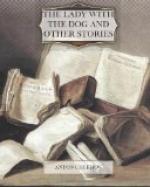His face seemed to Tanya ugly and unpleasant. Hatred and an ironical expression did not suit him. And, indeed, she had noticed before that there was something lacking in his face, as though ever since his hair had been cut his face had changed, too. She wanted to say something wounding to him, but immediately she caught herself in this antagonistic feeling, she was frightened and went out of the bedroom.
IX
Kovrin received a professorship at the University. The inaugural address was fixed for the second of December, and a notice to that effect was hung up in the corridor at the University. But on the day appointed he informed the students’ inspector, by telegram, that he was prevented by illness from giving the lecture.
He had haemorrhage from the throat. He was often spitting blood, but it happened two or three times a month that there was a considerable loss of blood, and then he grew extremely weak and sank into a drowsy condition. This illness did not particularly frighten him, as he knew that his mother had lived for ten years or longer suffering from the same disease, and the doctors assured him that there was no danger, and had only advised him to avoid excitement, to lead a regular life, and to speak as little as possible.
In January again his lecture did not take place owing to the same reason, and in February it was too late to begin the course. It had to be postponed to the following year.
By now he was living not with Tanya, but with another woman, who was two years older than he was, and who looked after him as though he were a baby. He was in a calm and tranquil state of mind; he readily gave in to her, and when Varvara Nikolaevna—that was the name of his friend—decided to take him to the Crimea, he agreed, though he had a presentiment that no good would come of the trip.
They reached Sevastopol in the evening and stopped at an hotel to rest and go on the next day to Yalta. They were both exhausted by the journey. Varvara Nikolaevna had some tea, went to bed and was soon asleep. But Kovrin did not go to bed. An hour before starting for the station, he had received a letter from Tanya, and had not brought himself to open it, and now it was lying in his coat pocket, and the thought of it excited him disagreeably. At the bottom of his heart he genuinely considered now that his marriage to Tanya had been a mistake. He was glad that their separation was final, and the thought of that woman who in the end had turned into a living relic, still walking about though everything seemed dead in her except her big, staring, intelligent eyes—the thought of her roused in him nothing but pity and disgust with himself. The handwriting on the envelope reminded him how cruel and unjust he had been two years before, how he had worked off his anger at his spiritual emptiness, his boredom, his loneliness, and his dissatisfaction with life by revenging




